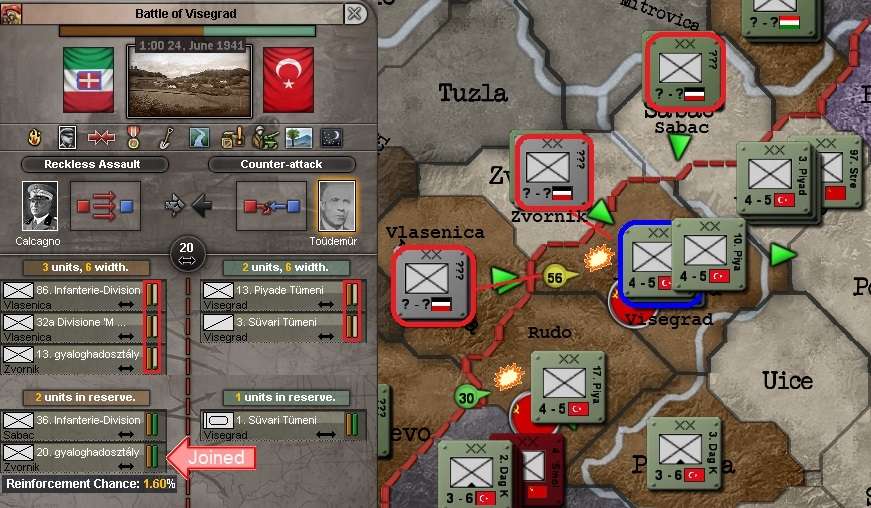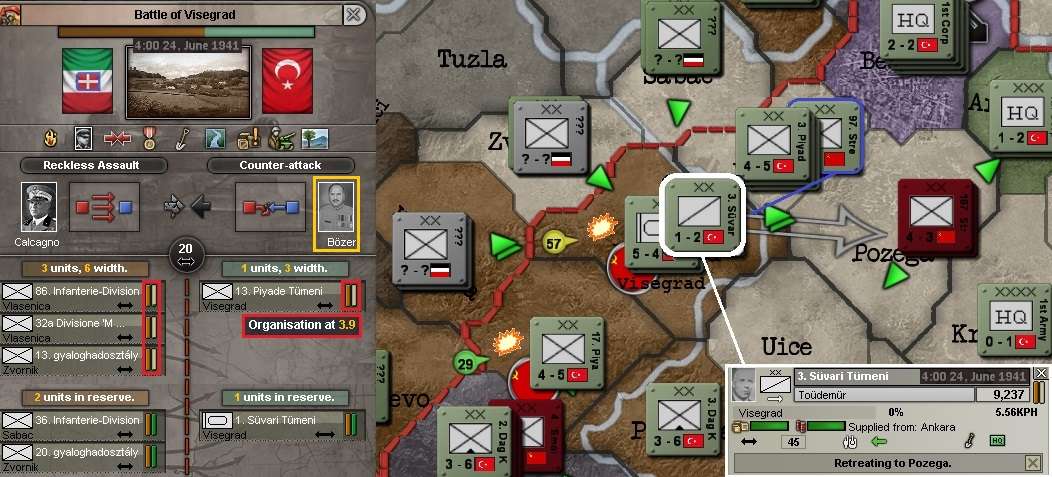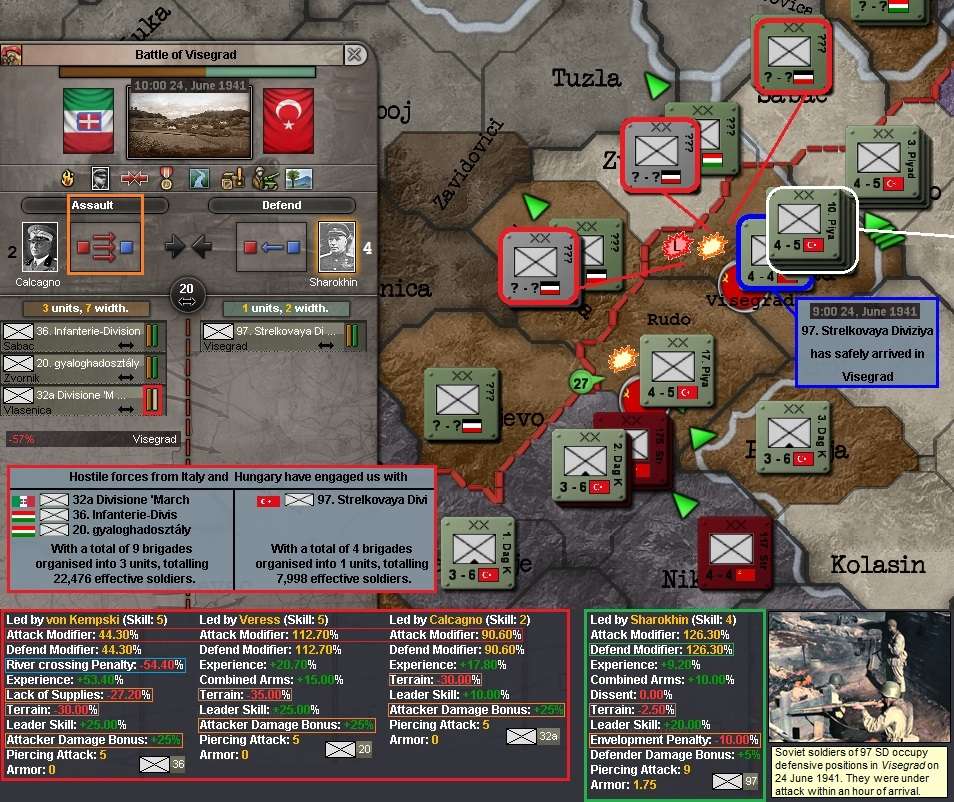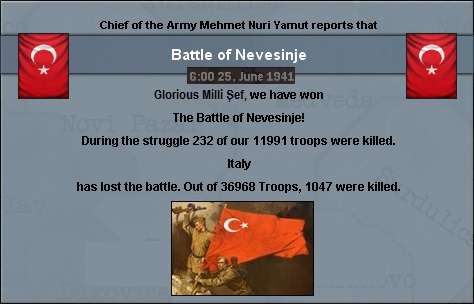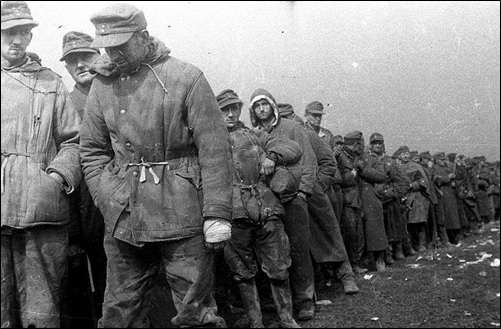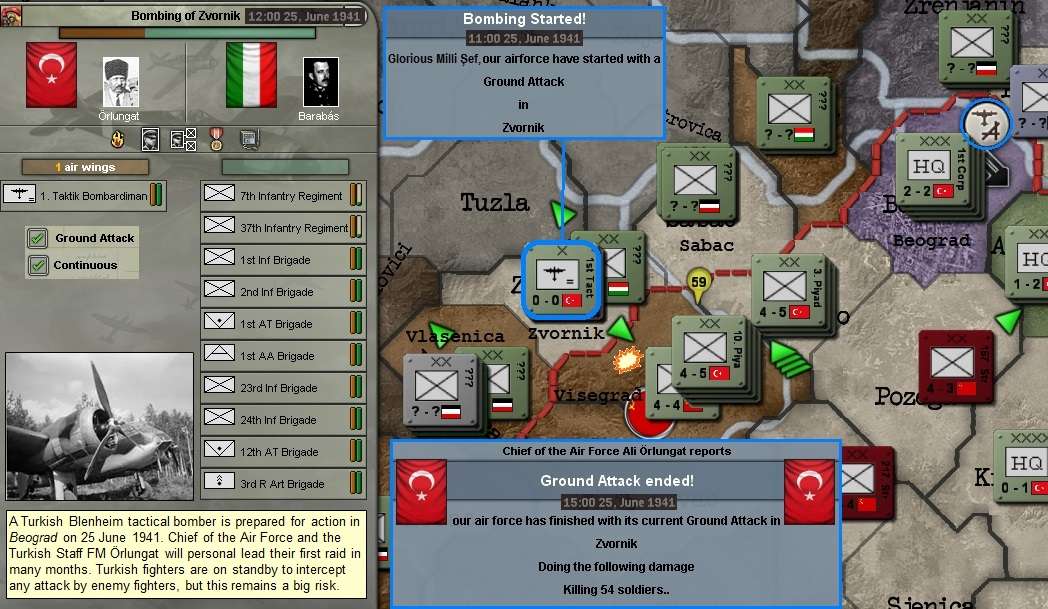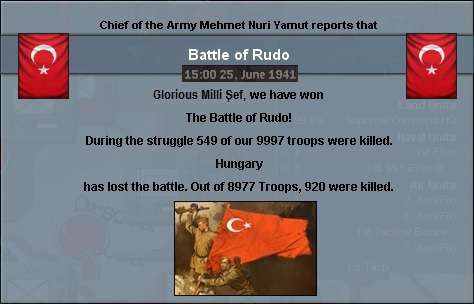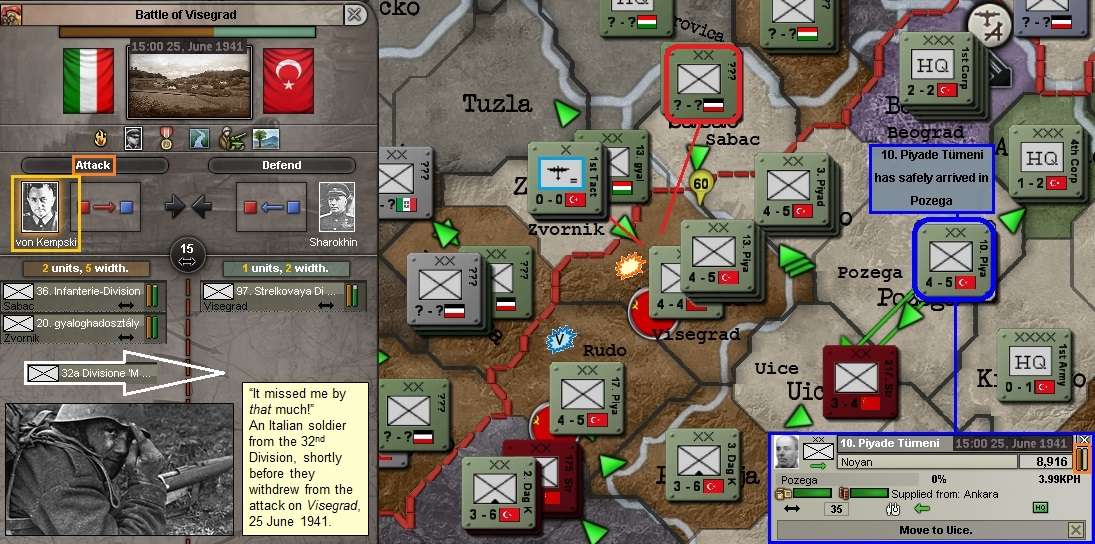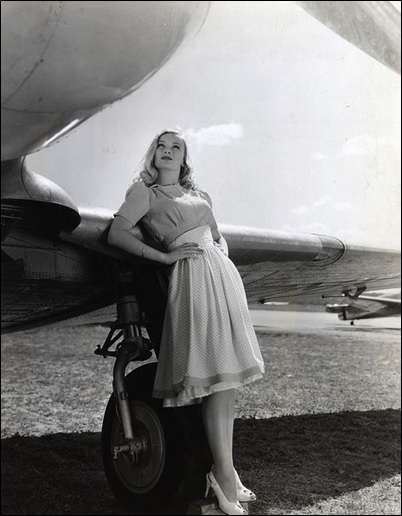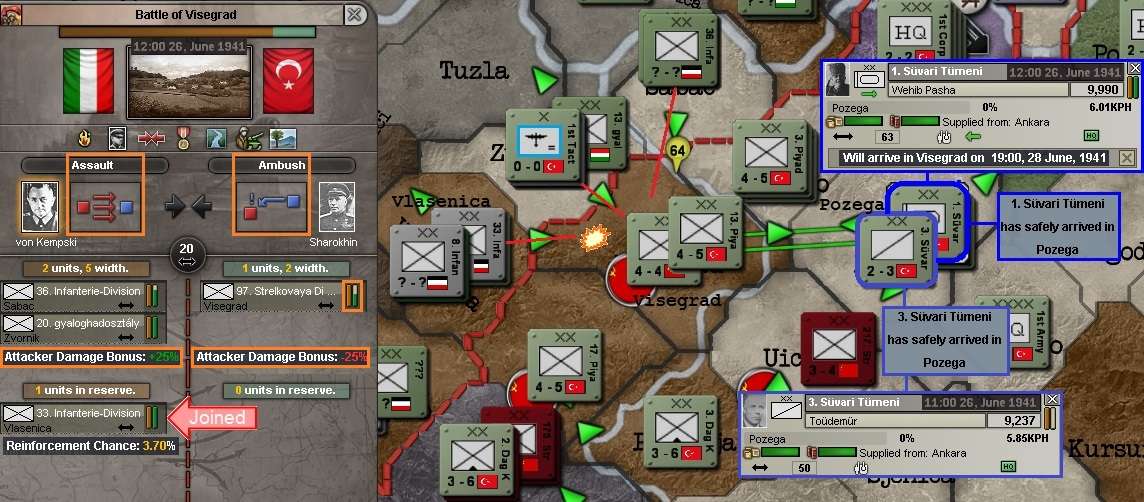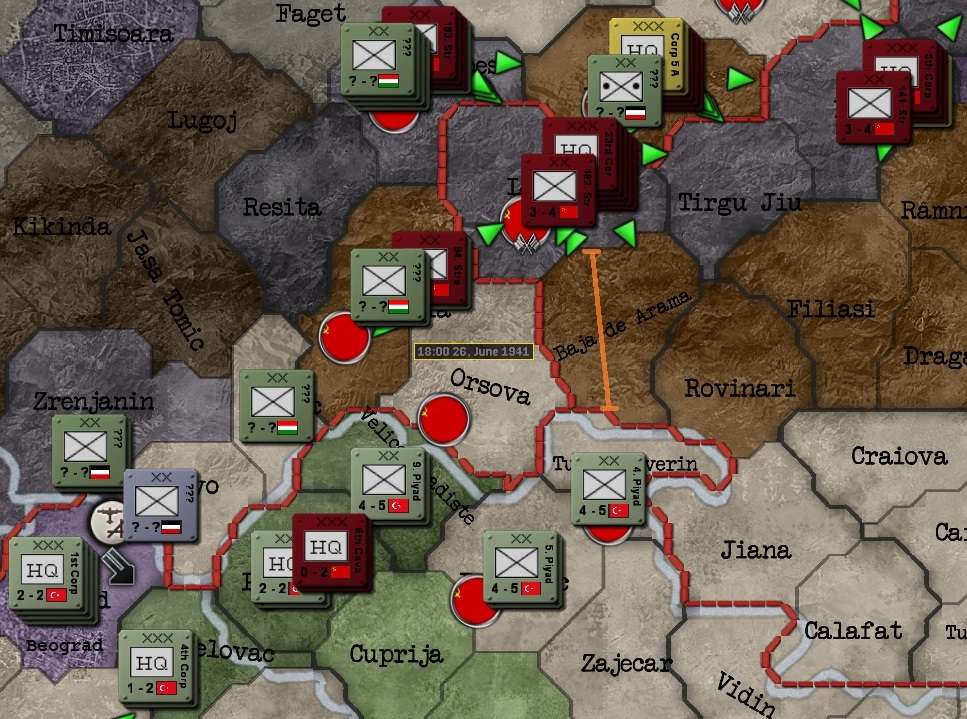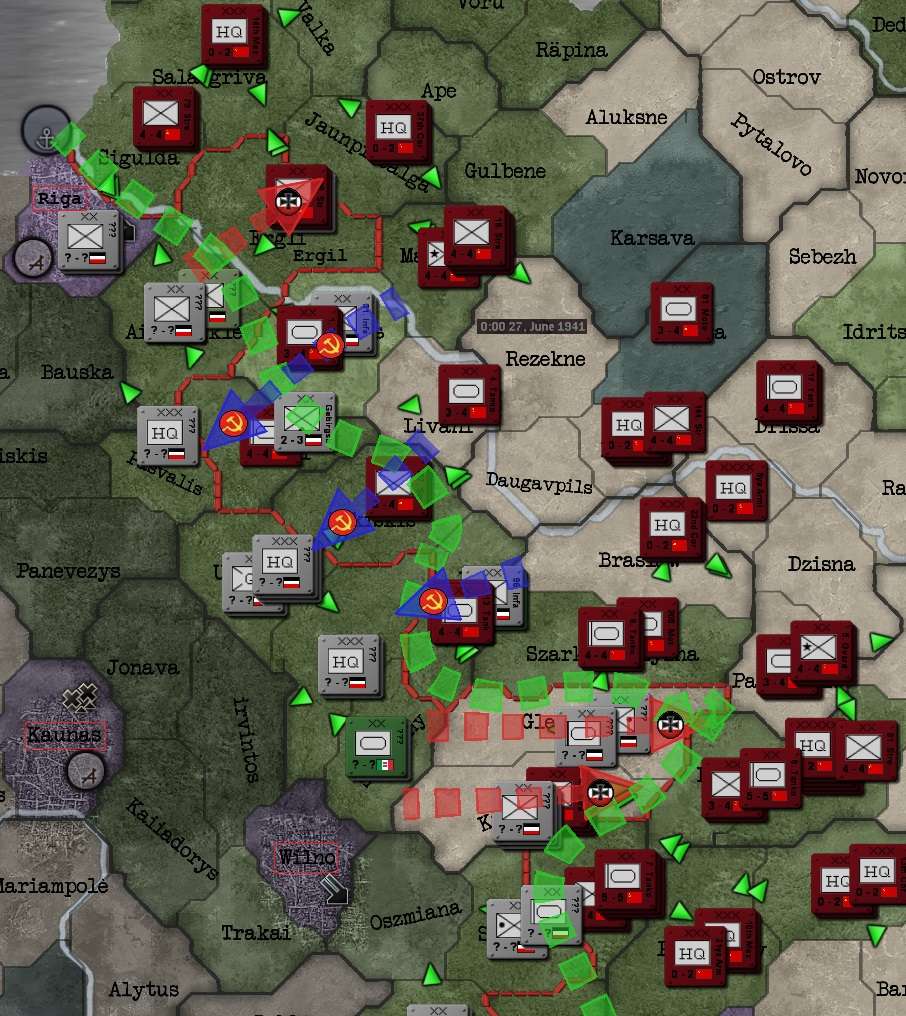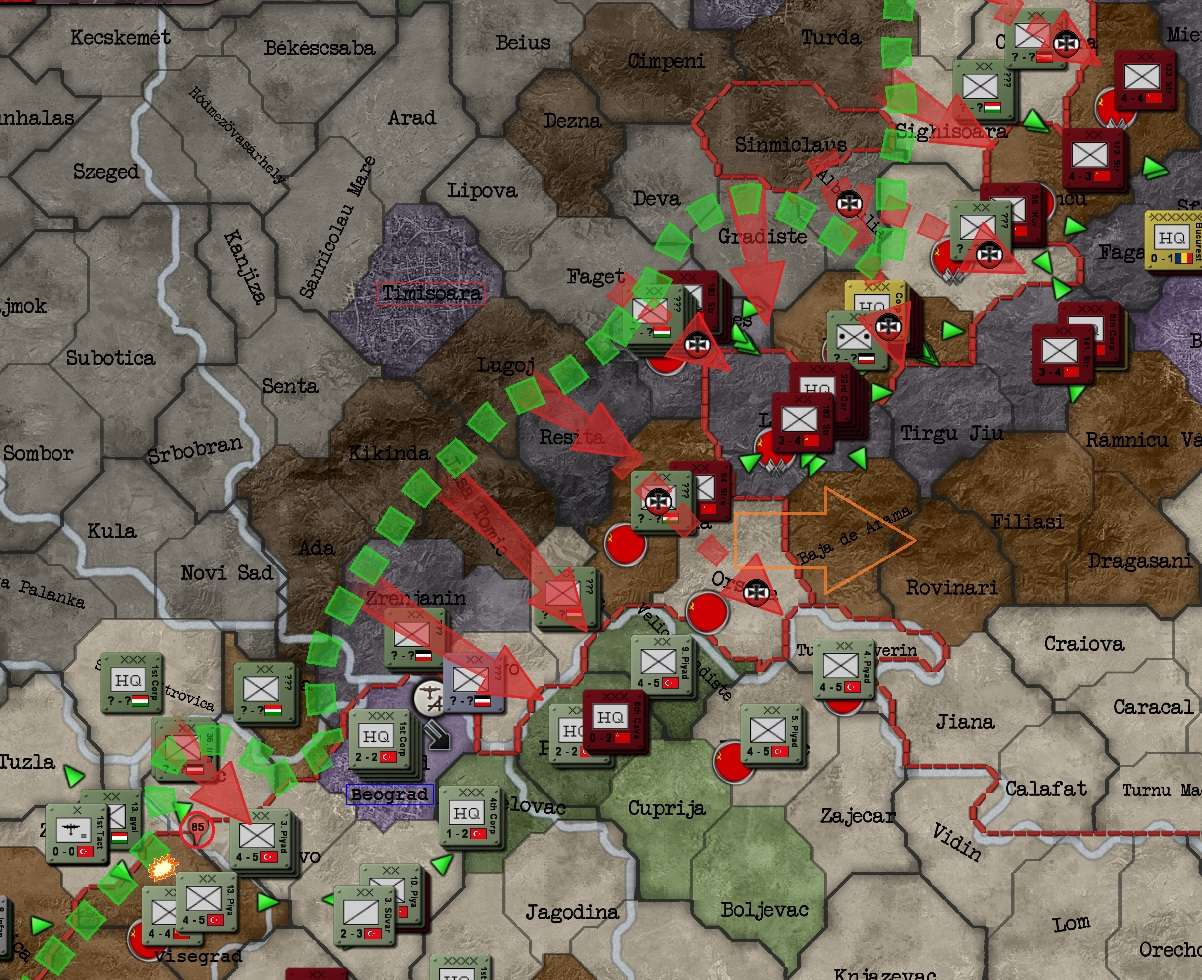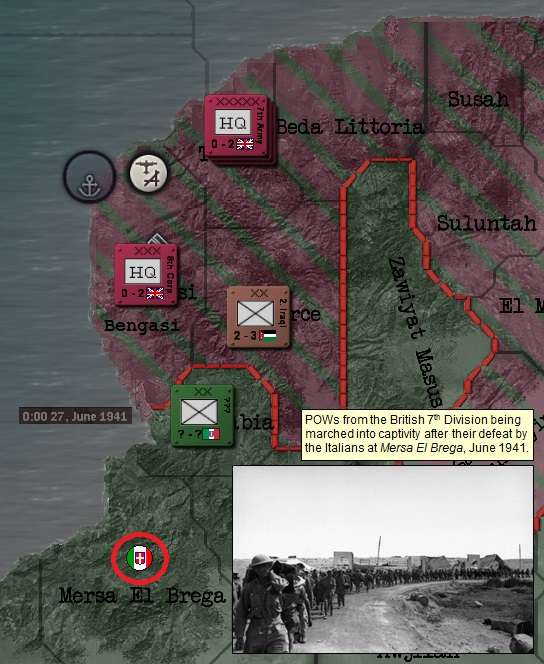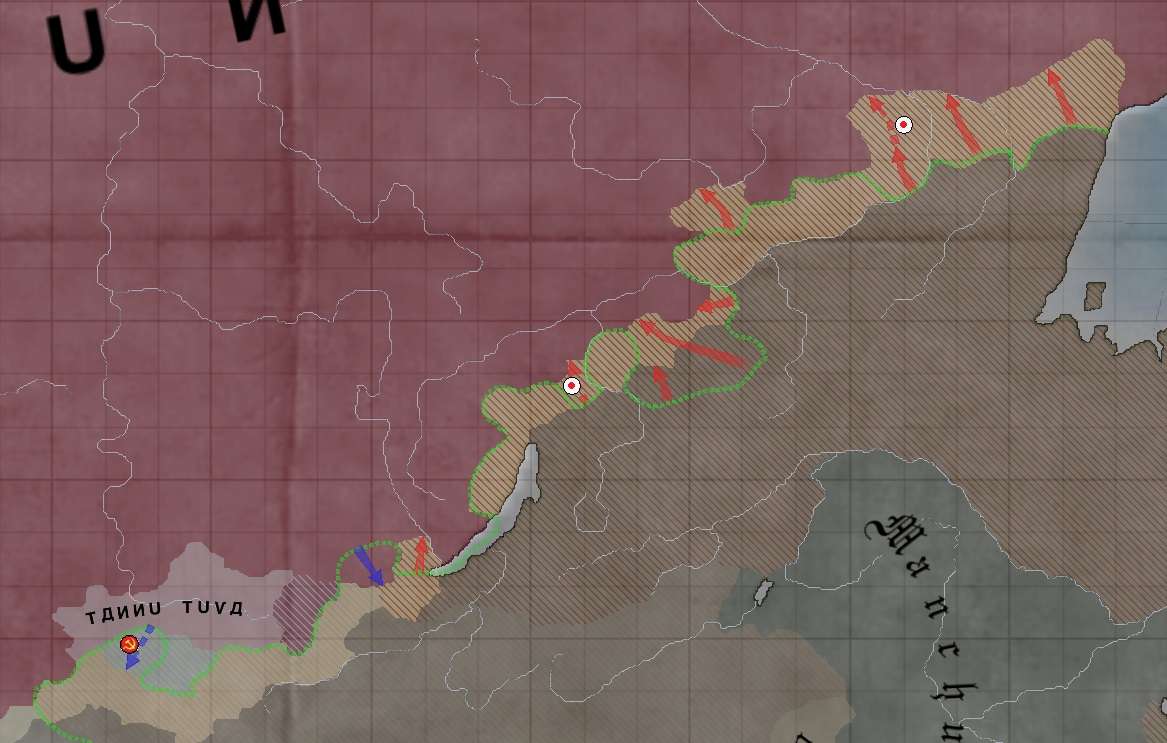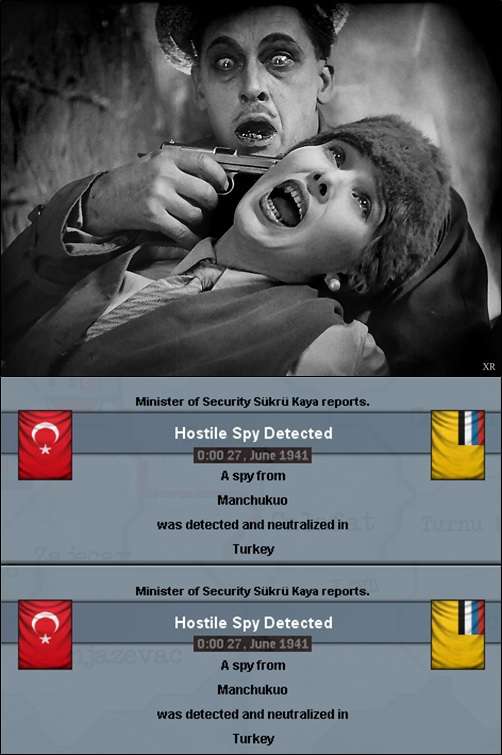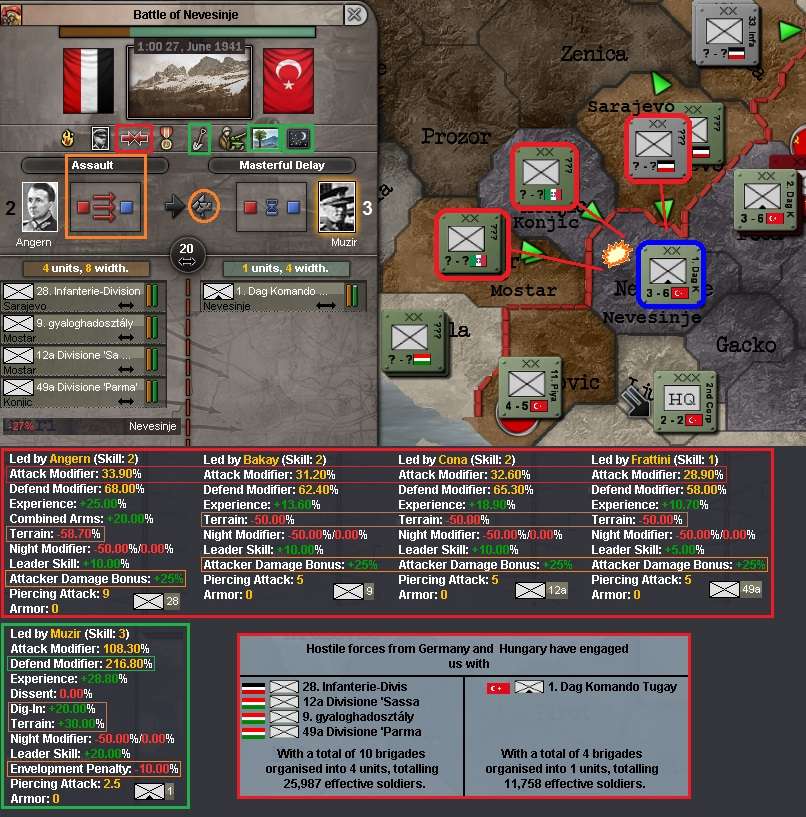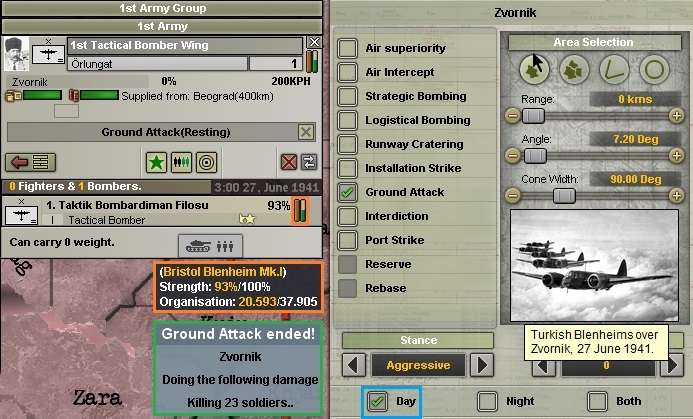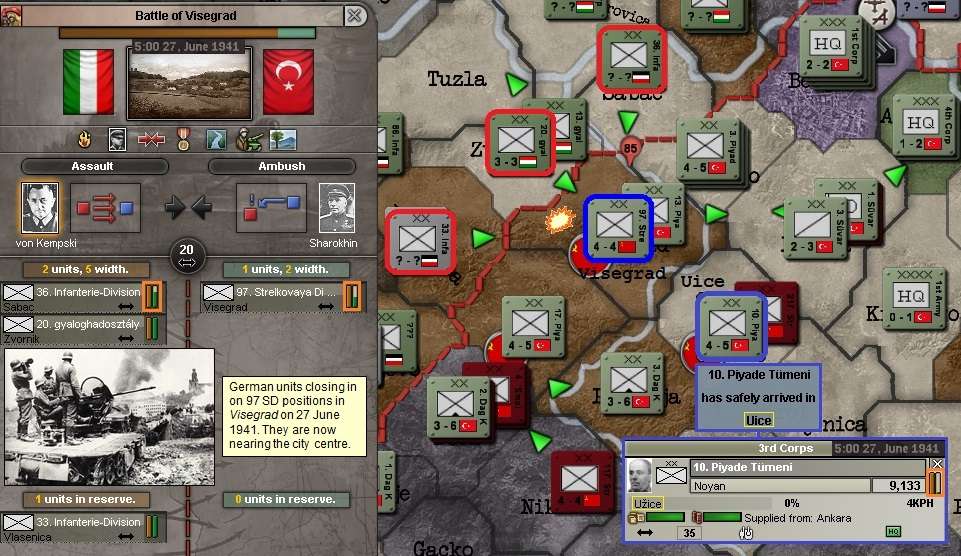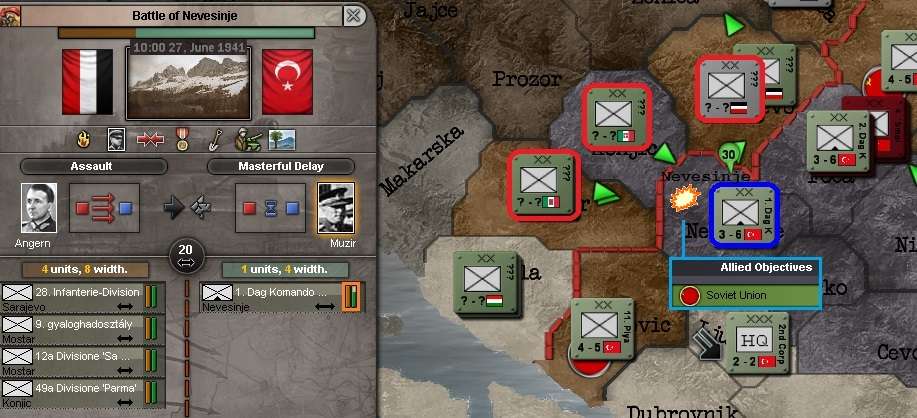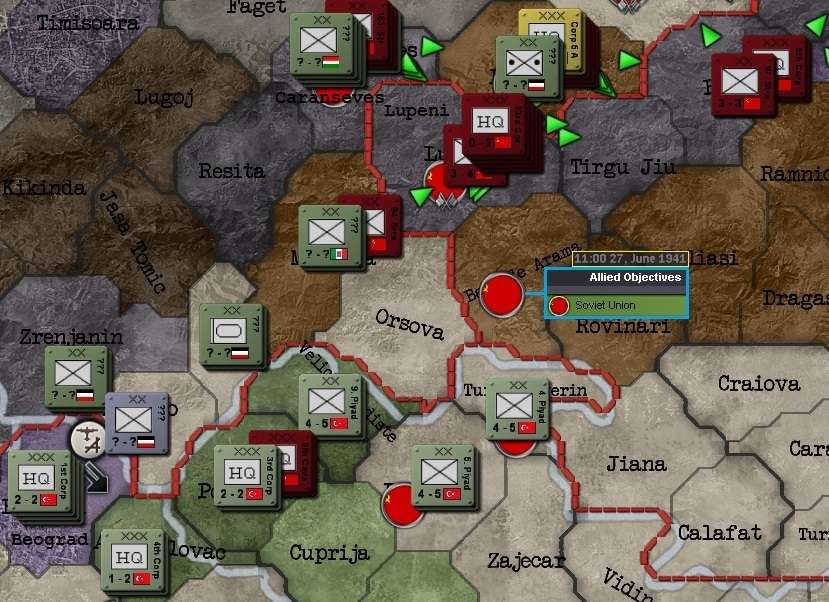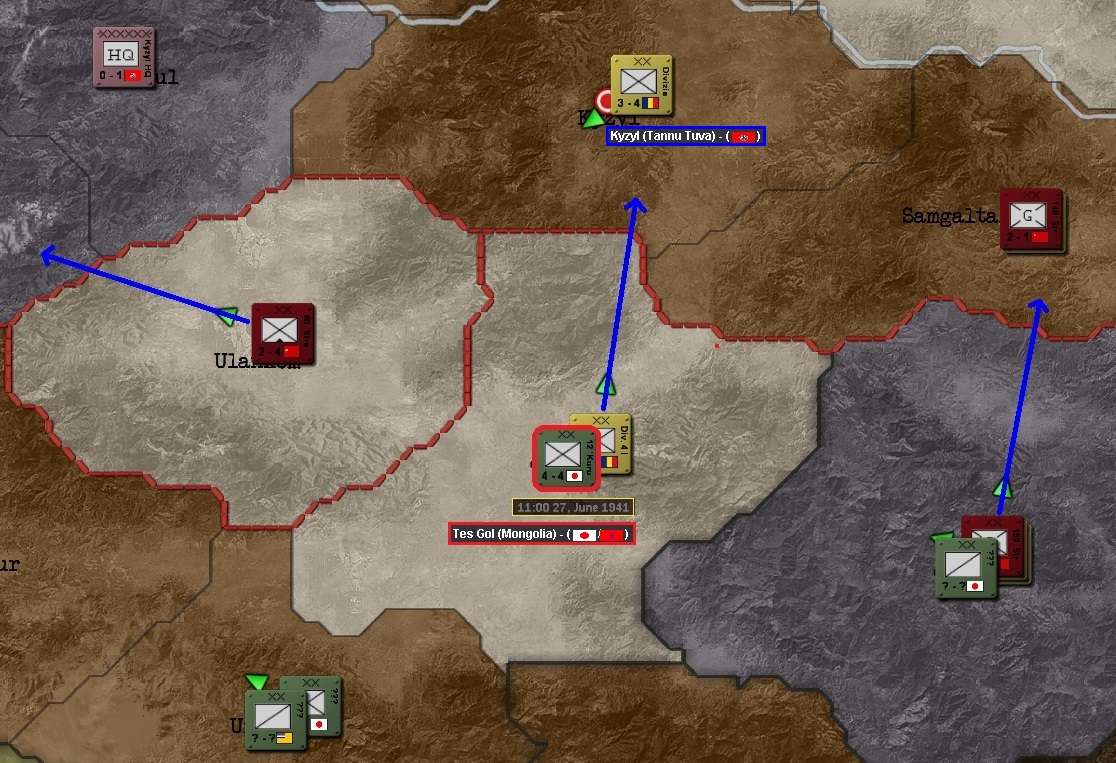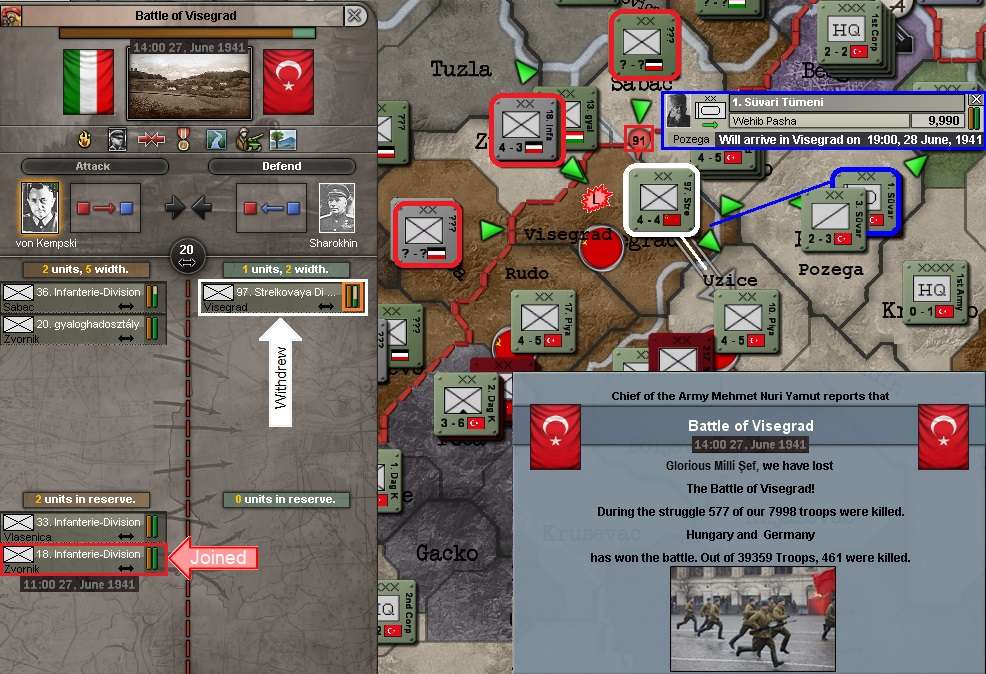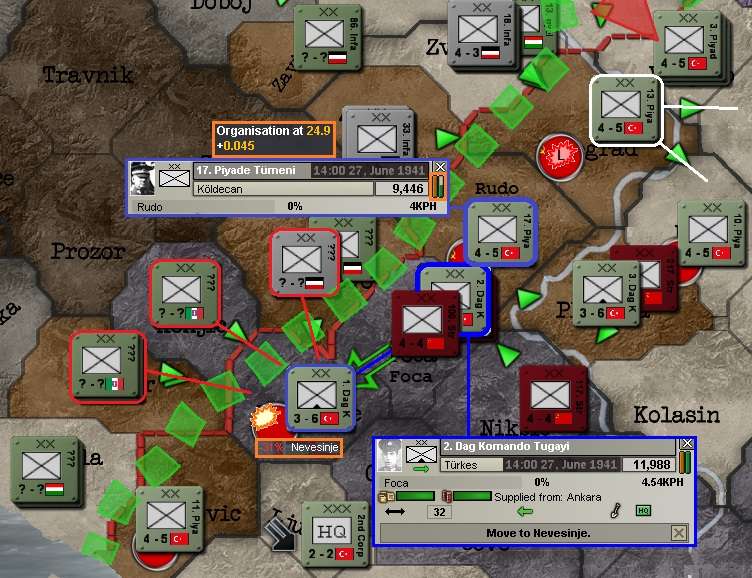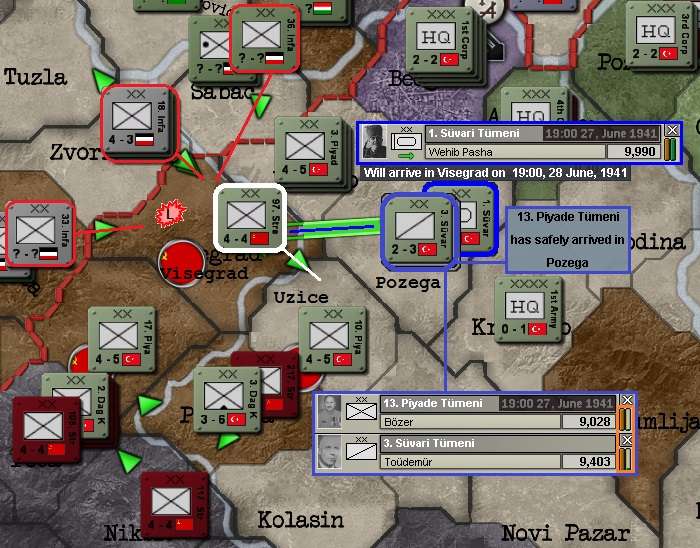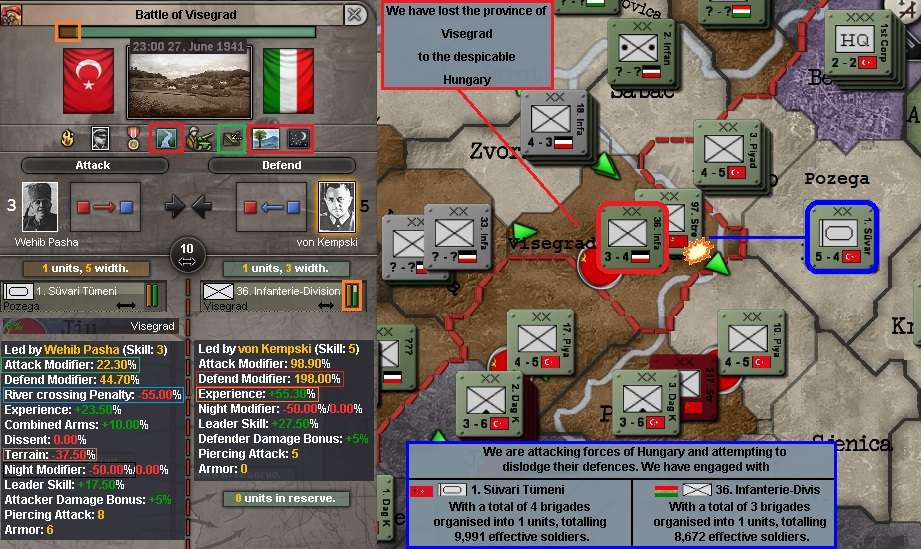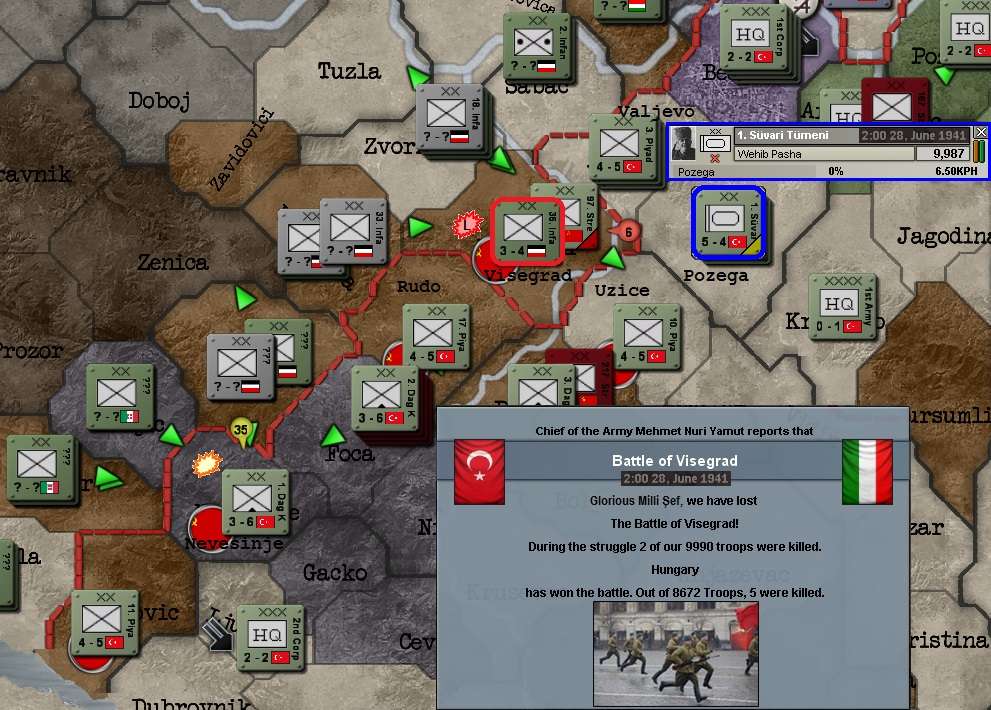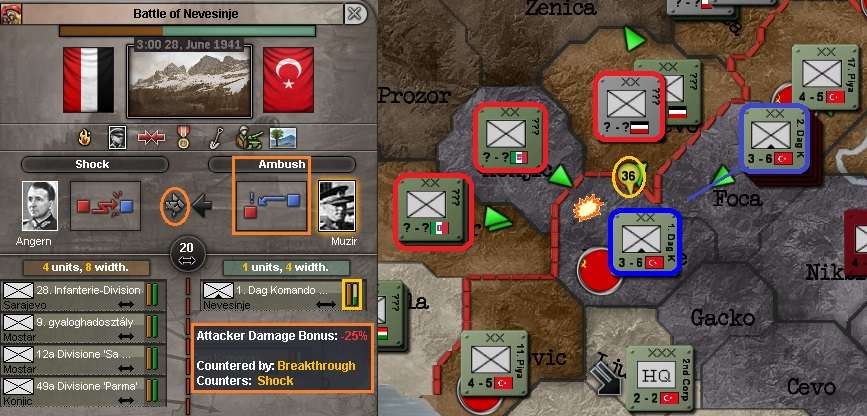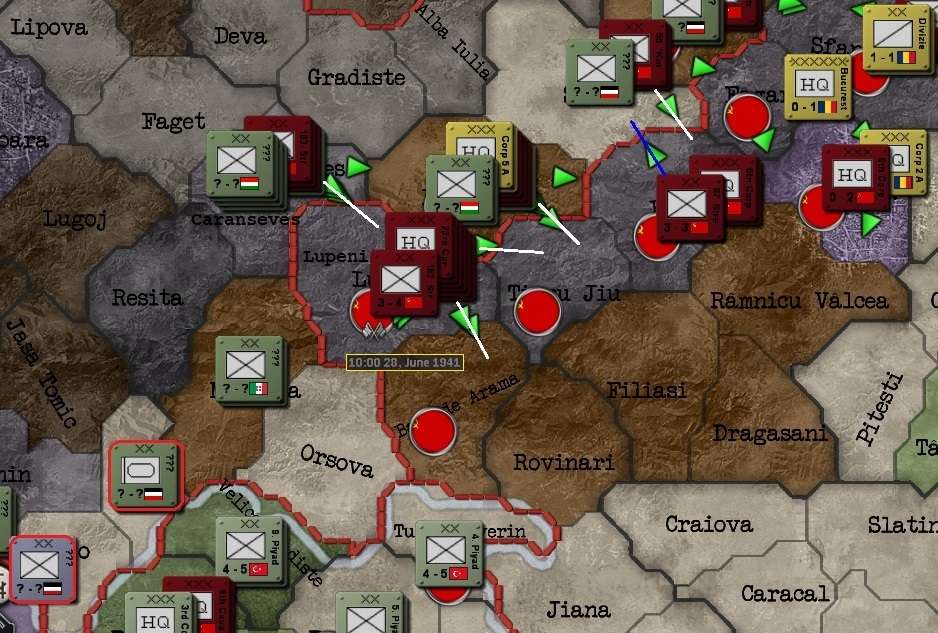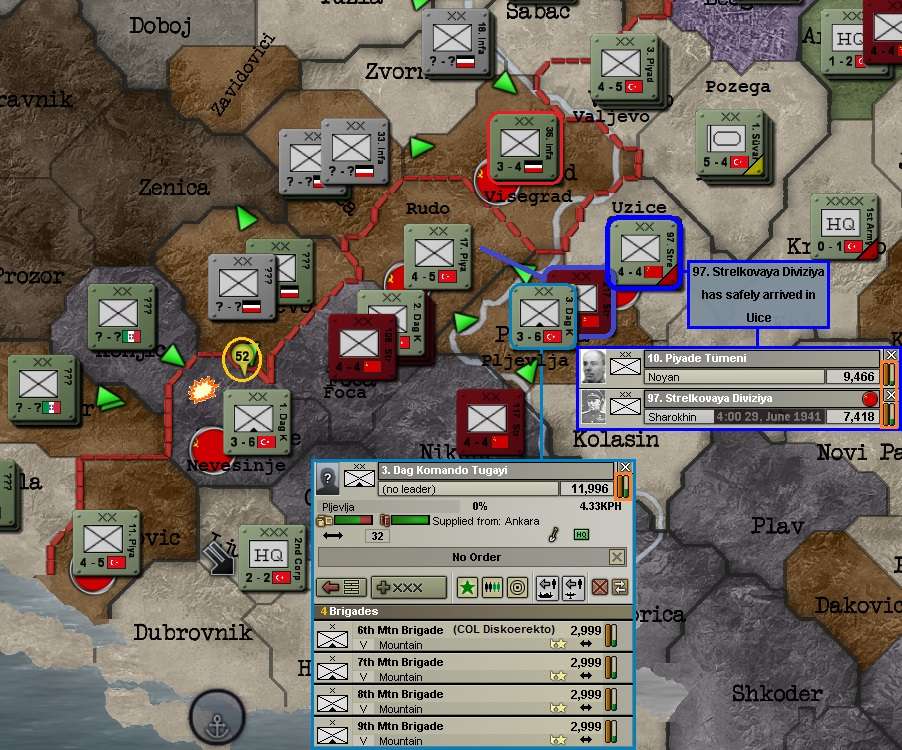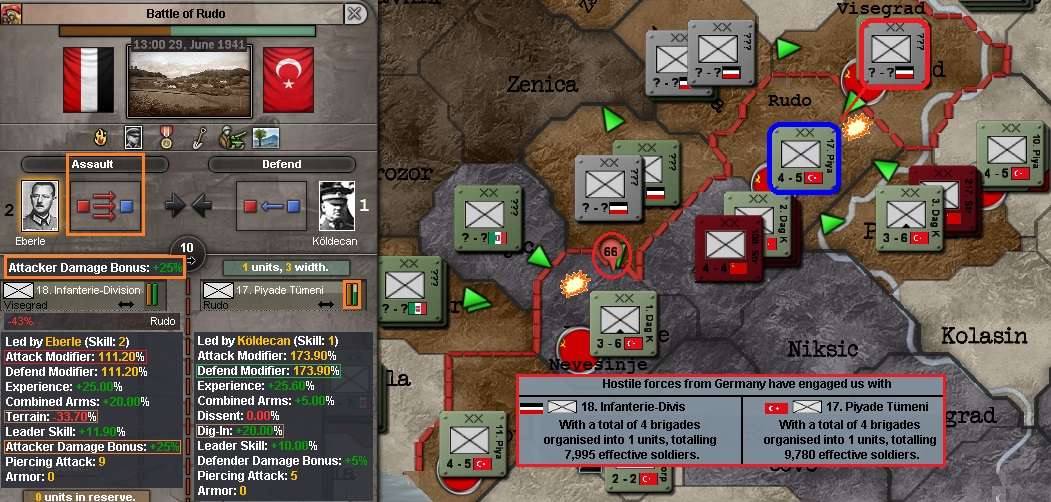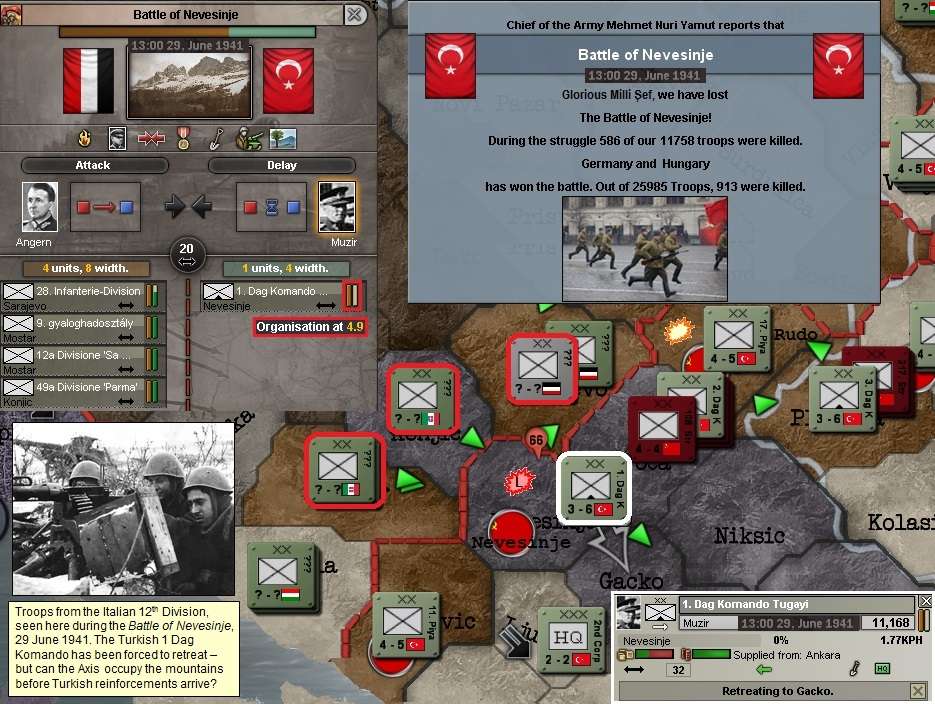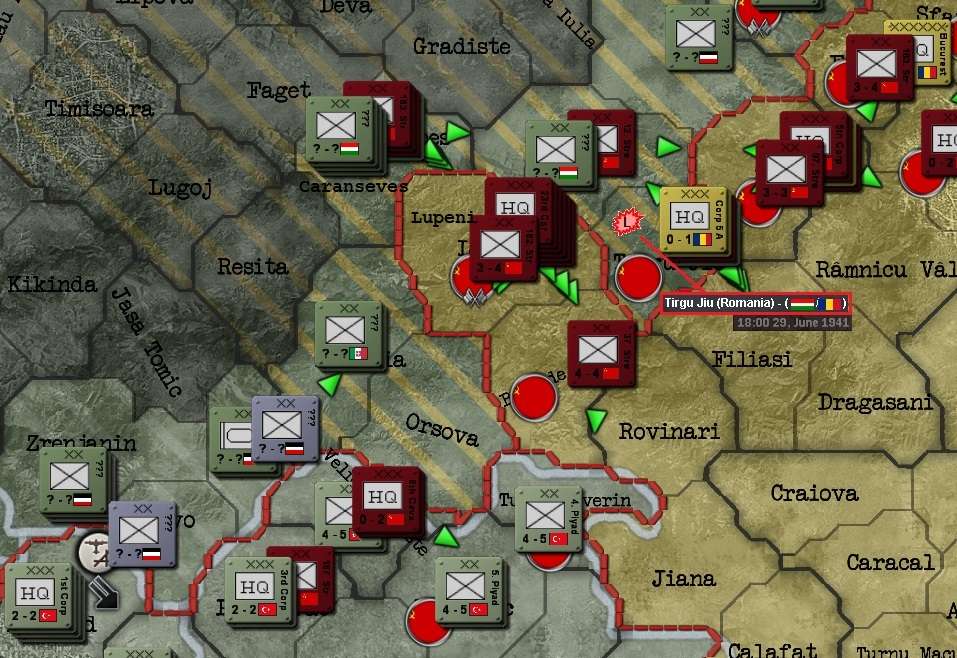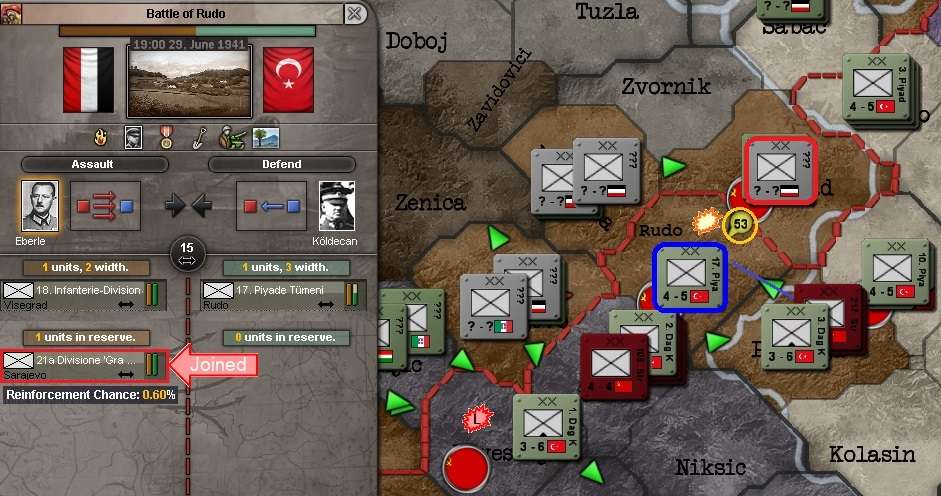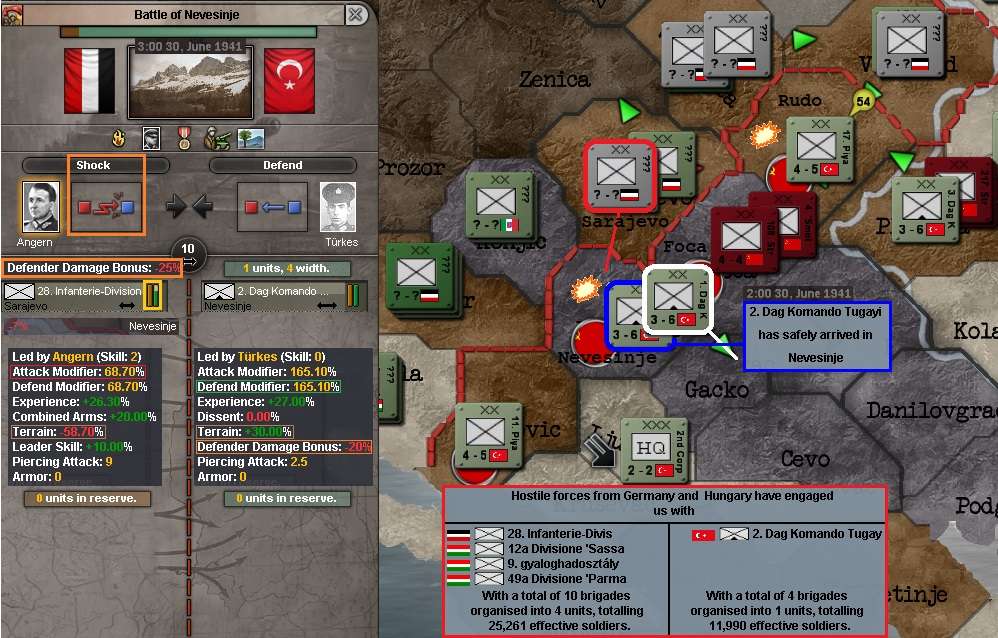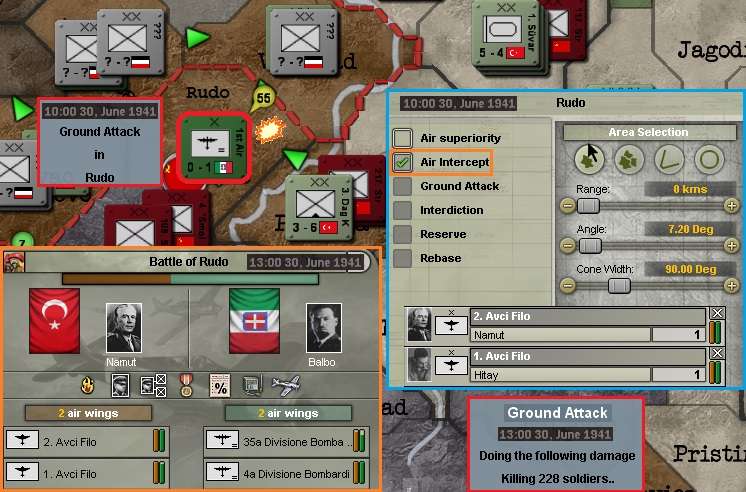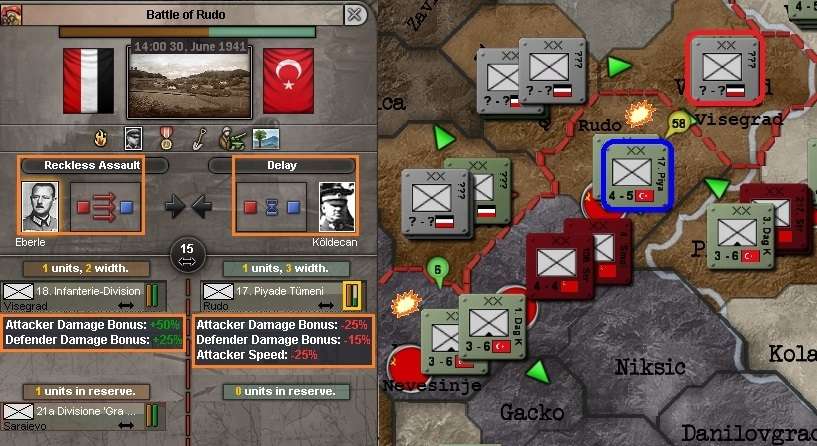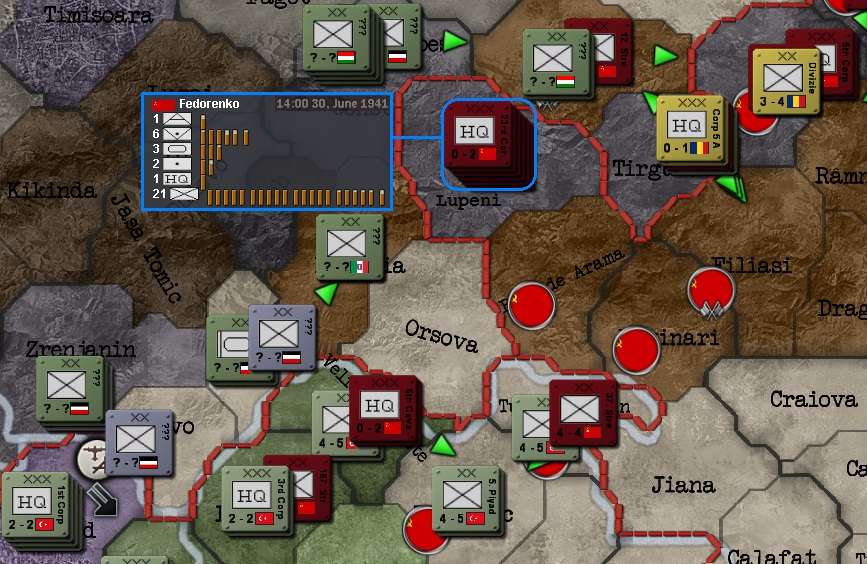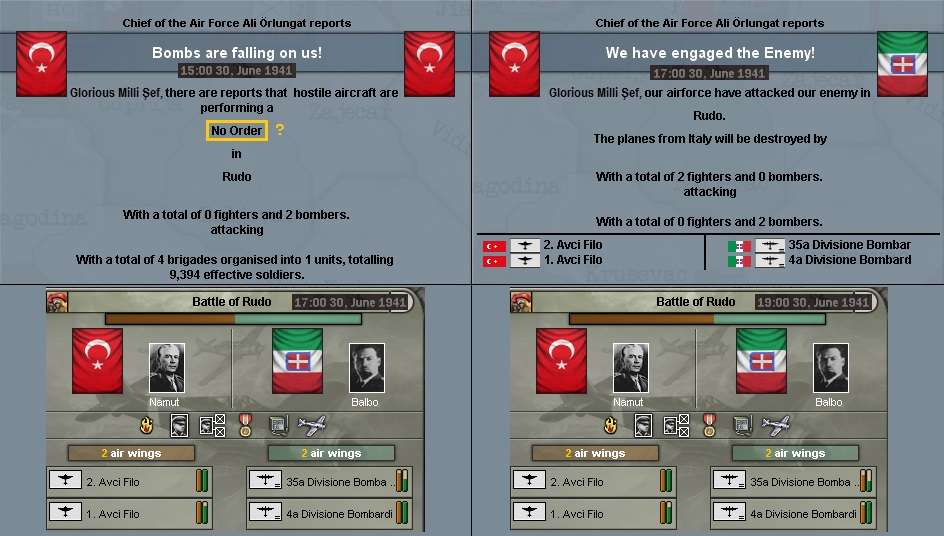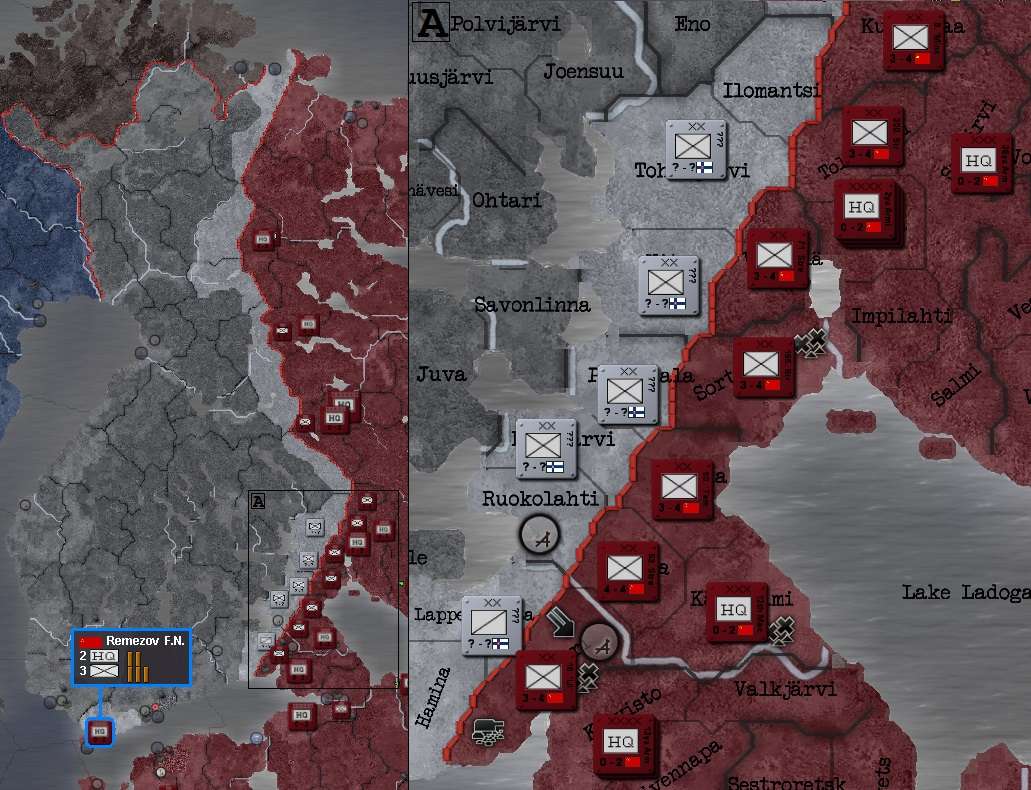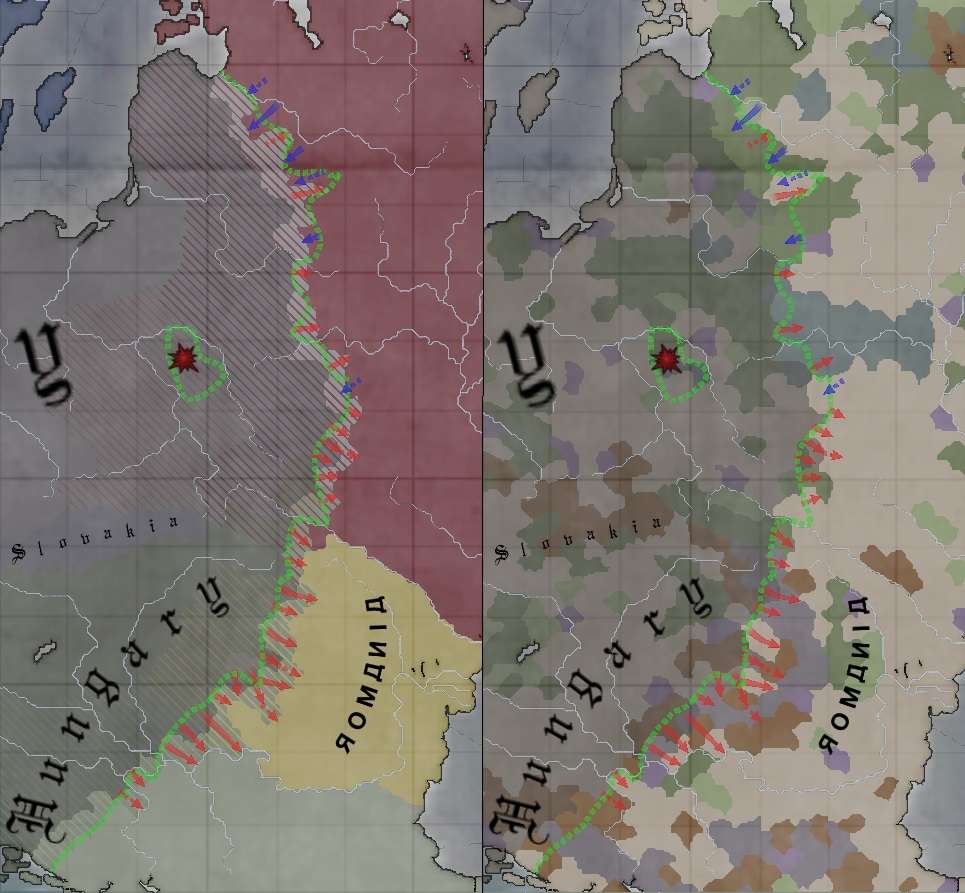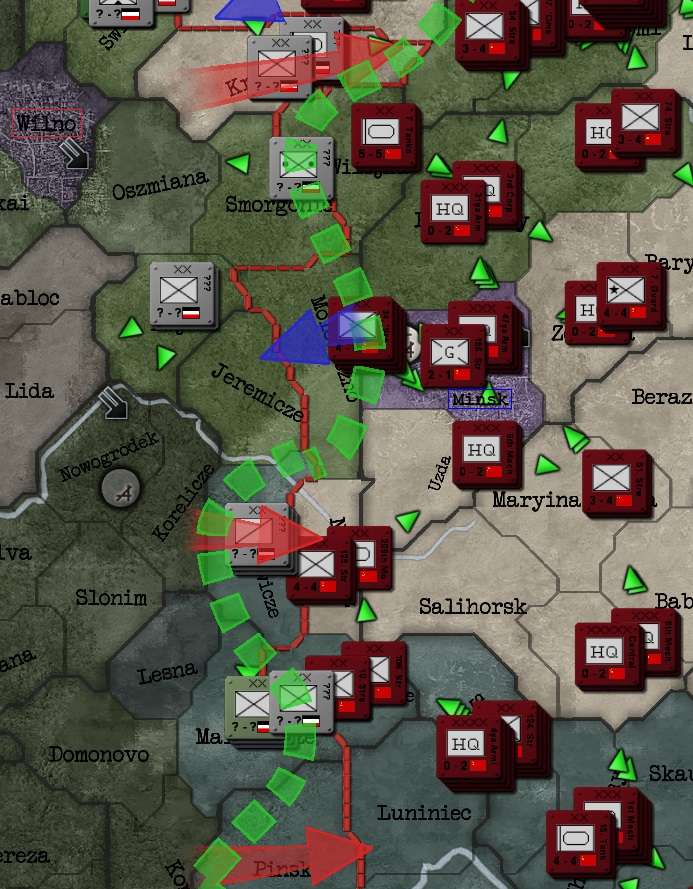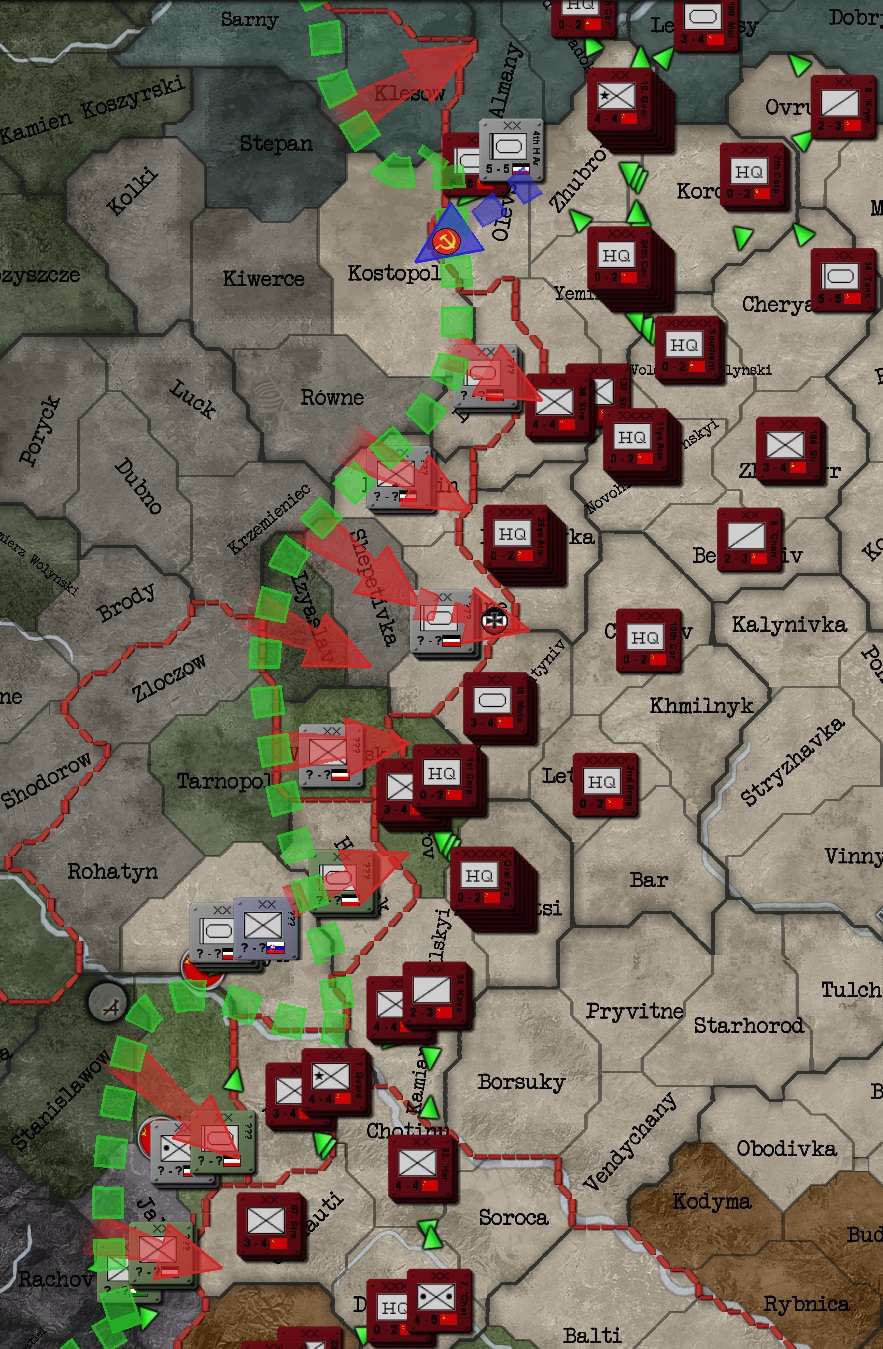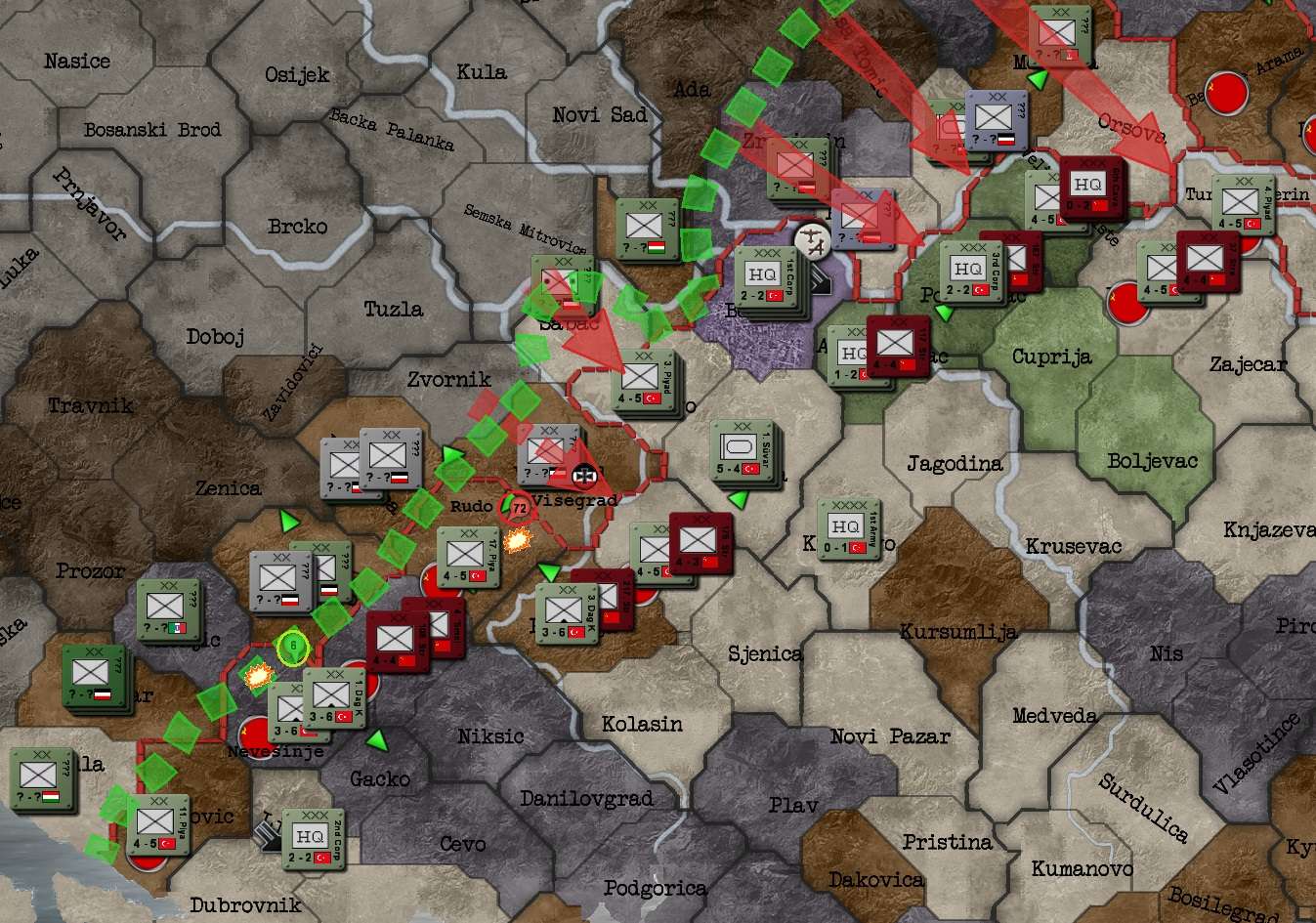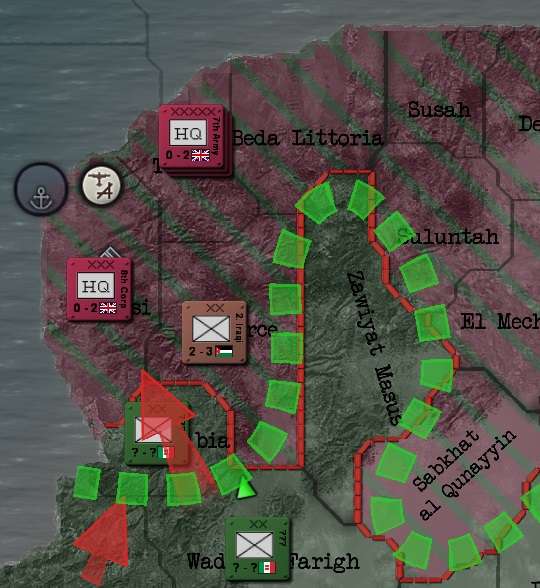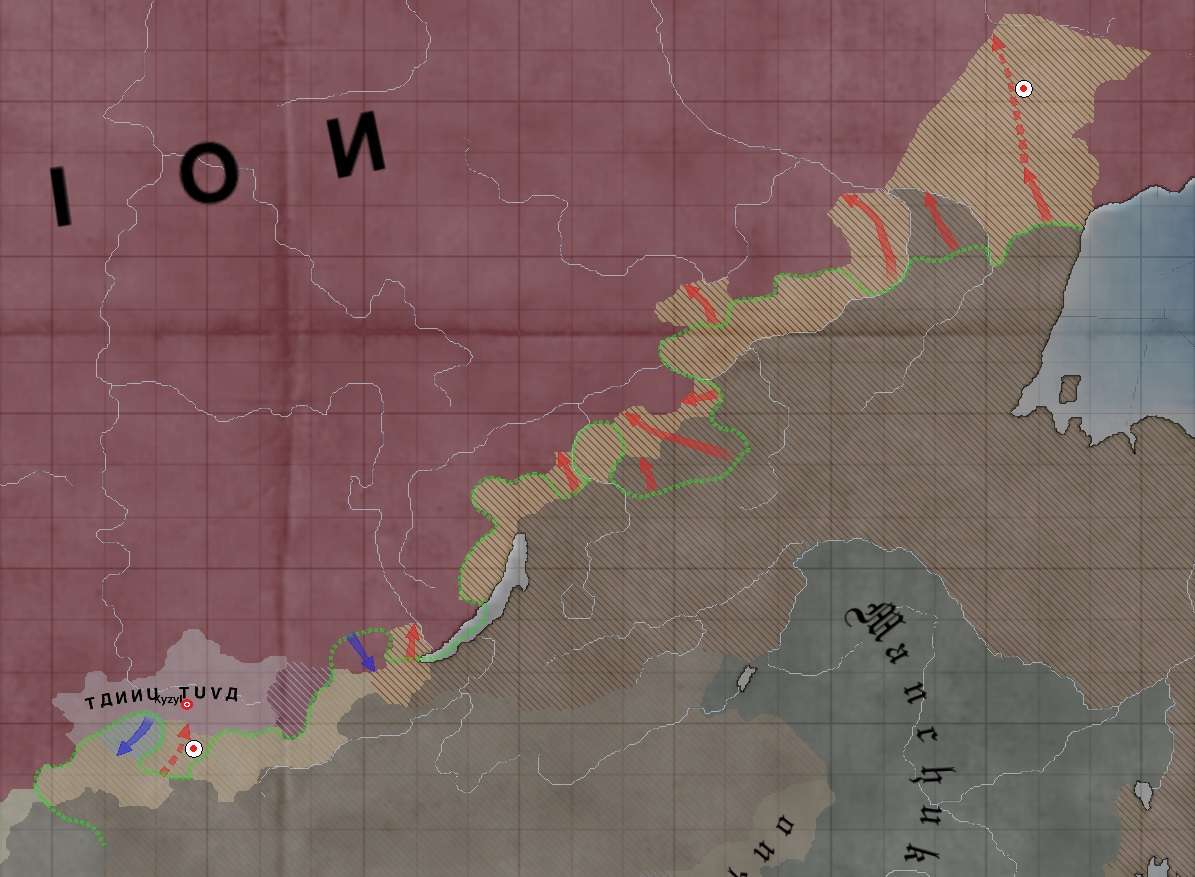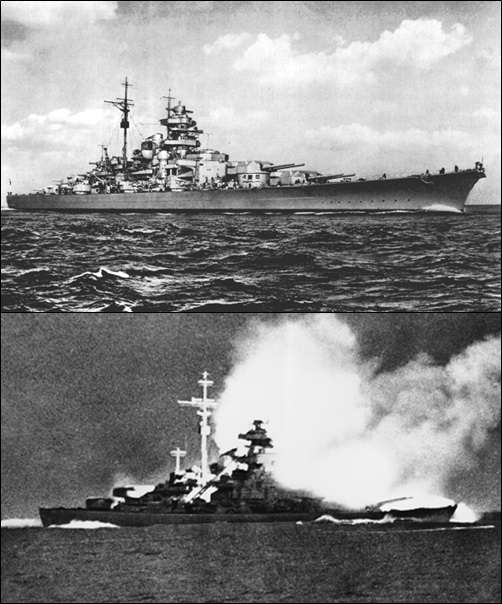Chapter 140: The Hills Are Alive with the Sound of Gunfire (27 to 30 June 1941)
27 Jun 41
Istanbul. Midnight. You know what
that means!

One of Şükrü Kaya’s squads moves in to apprehend a Manchurian spy in the pay of the filthy Imperialist Japanese. This time, they have suborned a local man to their cause. He is not only immoral and (by the looks of it) quite crazy: he also has extremely bad dental work.
As they move in to apprehend him, he grabs a nearby woman and puts a gun to her head. She screams in terror.
“Stop right there, or this lovely young lady gets it!”
The leader of the detachment of secret police quickly consults his notebook and a 'most wanted' leaflet with pictures. He then looks up at the man and says, calmly: “Yeah, OK, away you go then!”
The man is suddenly deflated, crazy bravado turning to sad resignation in a moment. He releases the woman, drops the pistol and puts his hands in the air.
“Ingrid, they’re on to us. If we cooperate, perhaps they will let us live.”
“Damnation! I knew we shouldn’t have taken that gold from Manchukuo, Cedric.” She turns to the police lieutenant, batting her eyelashes fetchingly. “Officer, if you let me go, I will let you know where we’ve hidden the gold. This man means nothing to me.”
“Ingrid! How could you!”
“Oh, you
will let us know about that all right – once Darth Kelebek has finished with you!” Her eyes roll up in her head and she faints on the spot. “Cuff ‘em, boys. Two berths on the
Midnight Express to Ankara for these two. All aboard!”
Two at once from the same place! Quite a haul.
---xxx---
At 1am, another report is received from 1 Mtn Div in
Nevesinje: the enemy are attacking again.
“One this is One Mike, contact, four Axis divisions attacking from three directions, over!”
“It’s not another feint like last time, is it? Verify enemy strength, over.”
“Verified. They are attacking in strength this time: we estimate over 25,000 German, Hungarian and Italian troops assaulting our positions. We attempted a delaying action but they have caught us on the hop. With these numbers, although we should exact heavy casualties on them, the position may become difficult, out.”
Despite terrain and entrenchment, the sheer number the enemy is deploying, their enveloping attack and superior tactics will make this a far harder fight than the previous Axis attempts to force the mountains of
Nevesinje. Muzir has his work cut out for him this time.
In the flight ops room at 1 TAK Wing in
Beograd, a young Air Force Lieutenant (Üsteğmen) is reading the latest mission analysis from the wing’s last bombing raid on
Zvornik, which finished at 3am.
“Sir,” he says to the squadron leader in charge of the ops room. “We suffer a 50% efficiency penalty when operating at night. With the few casualties we inflict on these night raids, it doesn’t seem worth the resulting drain on unit organisation from conducting round-the-clock raids.”
“You know, I think you are right Üsteğmen Hustaryin. And the enemy have an AA brigade there too, so it is quite a demanding run. I’ll pass on the recommendation to the Chief. Good work – carry on!”
Örlungat concurs: orders are issued to keep to daytime only missions.
In
Visegrad, despite a brave defence, the outnumbered 97 SD is slowly losing ground to the renewed Axis attack
[attack odds now up to 85% in the Axis’ favour]. To its south-east, 10 Inf Div had just arrived at
Užice [which at this point I realised the game was having problems spelling sometimes], where it would begin to try to recover and develop defensive positions behind the Sava River in case
Visegrad fell.
With daylight, the situation in
Nevesinje is starting to look a little precarious. The Soviets are requested to help the defence there with one of their nearby units, but the chain of command from STAVKA is notoriously unresponsive.
An hour later, the same is done for the
Baja de Arama Gap on the far end of the
Danube Line. To the north, a large number of mainly Soviet units is in danger of being cut off in
Caranseves – they must make it to
Lupeni along narrow mountain roads to reach safety. Another large group of Comintern units to their east is trying to escape to
Tirgu Jiu, which is currently undefended. Losing a large number of these units to the cause would be a heavy blow.
A cable simultaneously arrives from the Romanian Supreme HQ: it is word from the Far East, where they are trying to help the Soviets defend Tannu Tuva from the Japanese hyenas and their lackeys. Word has come through that the Romanian 4th Division has been driven from the plains of
Tes Gol: this now places the Japanese immediately south of the hills of
Kyzyl, the capital of the small Comintern satellite country.
The news does not get any better for President Inönü as the day wears on: another German division has joined the enemy’s reserve in
Visegrad, tipping the odds even further in their favour. With 1 Cav Div still over a day away, and 10 Inf Div in
Užice barely arrived and still thoroughly disorganised, the decision is taken to withdraw 97 SD before it is forced to retreat. And while it still has some organisation left, before casualties become ruinous. At 2pm they start to pull out south over the Sava River to
Užice.
Air Report. At that point, the raids of 1 TAK on
Zvornik (the last of which is currently still in progress) were called off. Their two raids (one night, one day) killed 93 Axis attackers that day.
As these events were playing out, the position in
Rudo was reviewed, given it was likely to come under pressure soon as well, especially if 1 Cav Div was unable to make it to
Visegrad before the Axis occupied it. While fully dug in, 17 Inf Div was still recovering from its previous defence of the hills there. If attacked in earnest, it could likely not hold indefinitely without reinforcement. And in
Nevesinje, it was assessed that, outnumbered as it was, even the famous 1 Mtn Div was likely to succumb eventually to the odds facing it. With strong Soviet forces in place in
Foca, the risk was taken to order 2 Mtn Div – commanded by the inexperienced
[Sk 0] MAJGEN Türkes – to relieve Muzir’s battered formation.
Rudo could be sacrificed if necessary, but if
Nevesinje fell, it would dangerously undermine the whole western sector of the
Yeniçeri Line. It was time for Türkes to truly earn his pay. They would just have to hope the Soviets did not abandon
Foca without notice.
By 4pm 1 TAK Wing was back in
Beograd. It had finished its raids on
Zvornik with 91% of its strength intact and organisation somewhat under 50%
[around 16/38]. It would now regain readiness until next called for.
That evening, 13 Inf Div (the previous unit to retreat from
Visegrad) made its sorry way into
Pozega. There, Bözer rejoined his colleague Toüdemür of 3 Cav Div fame in trying to patch together a defence of the key river line province. But neither unit was really in a fit state to fight yet. 1 Cav Div continued to try to slip into
Visegrad before the enemy could consolidate there, but it would take them another day.
But there was simply not enough time for them to get there first. The German advance guard (the highly experienced and well-led 36th Infanterie Division) occupied
Visegrad at 11pm that night. The terrain was now badly against Wehib Pasha’s men and the night conditions made the attack even harder. He pushed the probe as best he could, but the odds were badly against success – and many more Axis troops were on the way. The very demanding day ended on a downbeat note.
OTL: Eastern Front. Hungary declared war on the Soviet Union.
---xxx---
28 Jun 41
In the early hours of the morning, it was decided the probe on
Visegrad would ultimately be pointless. Given how thin the defence of
Pozega was (which was in turn critical to holding
Valjevo and
Beograd), it was called off before 1 Cav's strength and organisation were further eroded.
Visegrad would be the next piece of sacred ground conceded after many previous successful and bloody battles to hold it.
Muzir reported at 3am that the enemy had attempted a shock attack - but he had thoroughly outfoxed them with an ambush in the mountain passes. Unfortunately, the previous fighting had already drained his men badly. This latest tactic would help, but the odds were slowly building against him. The question now remained as to whether their comrades in 2 Mtn Div could get there in time for a relief: at least being in their element would mean they were moving much faster than their opponents could in such terrain.
To the east, by 10am many but not all of the Soviet formations isolated in
Caranseves had escaped to
Lupeni, but that too was far from secure. It was fortunate that the enemy had not decided to strike through the undefended
Orsova-Baja de Arama Gap to further isolate them. How this sector developed would determine whether the
Danube Line was viable even as a temporary delay position.
With no air activity, the rest of the day saw the heavy fighting in
Nevesinje continue, Muzir’s men gradually losing ground as their comrades approached from the north-east. That night, Inönü slept as best he could. He knew the next day would be a full one.
OTL: Eastern Front. German forces captured Minsk in Belarus. Albania declared war on the Soviet Union. [Comment: The Soviets still hold Minsk, so that is one point now where, even after over a year of fighting, we are doing better than in OTL. And Albania remains within the friendly borders of the UGNR.]
---xxx---
In
Rome, as midnight approaches, an official of the Vatican Bank is asleep in what
should be the safety of his own bed. But he is troubled by a recurring nightmare: a dark, faceless creature. Manlike, but not a man. Glowing red eyes. Wings – red, resembling those of a butterfly, but somehow, more reminiscent of the fabled Viking blood eagle. A horribly calm but menacing voice, which is felt more than heard.
“Human cockroach. I have come for my due!”
This last is too much for the man, a part of whose mind knows it is but a dream. He forces himself awake. He sips from a glass of water to calm his nerves.
Nothing but a bad dream, he reassures himself.
But his thoughts are disturbed by a feeling of imminent danger. The hairs on the back of his neck rise. He quickly looks around into a dark corner of the room behind him – but there is nothing there.
Relieved, he turns back to the front again. To be confronted by two faintly glowing eyes in a perfectly still – unnaturally still – face. It is a human-looking face, but somehow not really human in some subtly undiscernible way.
“I have come for my due,” Kelebek murmurs sibilantly. “It is time to fulfil your debt to me, insect.”
It
had been a dream. But also a premonition. Kelebek was back in
Rome. And where he went on a mission, the blood
always flowed. Over the next few days, he whispered harsh instructions to his human catspaw in the Vatican Bank. Groundwork was laid for the future. Though all remained under cover. For now.
---xxx---
29 Jun 41
97 SD had made good time in their controlled withdrawal from
Visegrad, joining 10 Inf Div in
Užice. Ill-prepared as they were, they now found themselves on the front line! As was
Pljevlja, where the newly raised 3 Mtn Div was still working up and remained at under 50% organisation. And without a permanent commander. COL Diskoerekto had arrived a few days before and was already busy inspecting defences, reviewing plans and doing what he could to bring his new command – the 6th Mountain Brigade – to readiness before the enemy fell upon them. But the hills and river line would make a sound defensive position. The Soviet 217 SD was helpfully heading from
Pljevlja towards
Rudo, where Köldecan fully expected to be the next to feel the wrath of the relentless Axis offensive. And the odds continued to worsen in
Nevesinje: this would mean casualties would now start being felt more heavily by the defenders.
At 9am, Muzir reported candidly to Inönü on the field telephone: his organisation was now very low
[6.9] and it was doubtful he would be able to hold out for too much longer. But he continued to delay the enemy for as long as he could.
After a hasty and uneasy lunch, Inönü looked up from his desk in the CP. The command net had again burst into life.
“One this is One Seven, we are under heavy assault. Enemy identified as the German 18th Infanterie Division, attacking from Visegrad. We can hold for now, but even in a one-one fight the situation is difficult. They are fresh and we are not quite at two-thirds combat efficiency. Out.”
The feared attack on
Rudo had commenced. And the situation in
Nevesinje had steadily worsened
[the odds had gone ‘red’, at 66% against].
The President and Army Commander was soon on the phone to Muzir, who was dangerously close to being routed:
“One Mike this is Sunray Major. Honour has been satisfied – get your men out of there while you can still direct their withdrawal. Fall back to Gacko. We will see if Türkes can plug the gap in time – then hold it if he does.”
“Yes, Milli Şef!”
“Be prepared to put your men in trucks and head back to the depth defensive position on the Tirane-Sofiya Line if Nevesinje falls. We’re running out of men to hold this current line.”
“Roger, moving now, out.”
The Axis have paid a heavy price for Nevesinje – and have not yet collected it, either.
As 2 Mtn Div tries to make it to
Nevesinje in time and 17 Inf Div fights on in
Rudo, more troubling news comes from the Romanian LO.
Tirgu Jiu in the Carpathian Mountains had fallen at 6pm, apparently without a fight! This now puts
Lupeni in a dangerous salient – and there are still significant Soviet forces retreating to it from
Caranseves. A collapse of this sector of the line is now a distinct possibility – and Turkey no longer has any capacity to intervene. The situation will be monitored closely – the CP has become a very tense and sombre place in the last few days.
To make matters worse, the Axis assault on
Rudo was augmented at 7pm by the arrival of the Italian 21st Division. Should they reinforce, the chances of holding it would rapidly deteriorate.
OTL: Eastern Front. The Defence of Brest Fortress ended in German victory. The Germans and Finns launched Operations Silver Fox and Platinum Fox, aimed at capturing the key Soviet port of Murmansk.
---xxx---
30 Jun 41
“One this is Two Mike. Objective reached at 0200 hours, enemy resumed attack at 0300 hours. Although four Axis infantry divisions were detected in the vicinity, at this stage only one – the German 28th Infanterie Division – is actually attacking. They are attempting to shock us as we settle in, but so far the situation is under control. Out.”
So, the latest Battle for
Nevesinje enters its second phase. It is hoped the enemy will take heavy casualties. The fear is other divisions may reinforce over time, or launch a fresh and coordinated attack if this one fails.
In
Rudo, the Italian tactical bombers have returned to the skies, commencing a ground attack run at 10am. 1 and 2 Avci Filo are scrambled to intercept and cause some damage, but the Italians were able to complete their raid and cause heavy casualties. Next time, the fighters will be better prepared, with standing orders to react to any further attacks on
Rudo.
At 2pm, a new reckless assault by the enemy in
Rudo is met by MAJGEN Köldecan with delaying tactics. He is in trouble now, but hoping Soviet relief is on the way.
In Romania, the Soviet forces retreating from
Caranseves appear to have made it back to
Lupeni – but they all seem to have stopped their withdrawal from the salient: they would be better off out of there and solidifying the line to the south-east, not risking being cut off and annihilated. There are 33 brigades and an HQ at risk of being isolated:
Come on, get moving, is the thought of everyone in 1st Army HQ. Visions of what happened in the Far East at the beginning of the campaign against the Japanese remain fresh enough to cause grave concern. A year later, the effects of that disaster are still being felt.
At 3pm, the air raid alert sounds again in
Rudo – but this time the enemy bombers (still without escorts) are ambushed and heavily engaged. It seems the response has caused them to abort any further strikes
[“performing a No Order”  ]
] and there are no Turkish casualties reported on the ground this time. Vur ha!
Fighting continued in
Nevesinje and
Rudo for the rest of the day, but without any further significant developments.
Air Report. There were just the 223 Turkish casualties in
Rudo in the single raid that made it through that morning. The Italian bombers were not seen again for the rest of the day.
OTL: Eastern Front. German forces captured Lvov [Lwow in-game, which the Germans have held for a while now]. The Organisation of Ukrainian Nationalists announced the Declaration of Ukrainian State Act and declared the Ukrainian National Government. Vichy France severed diplomatic relations with the Soviet Union.
---xxx---
Summaries
Inönü read through his latest summaries in the relative quiet of that evening – the end of the first month of the main ‘campaigning season’ for 1941. There had certainly been reverses and ground conceded, especially in the south and the Balkans, and Romania's survival was looking in the balance now. But
Beograd still stood in Turkish hands after 13 months of the
Great Liberation War – and the Soviets were largely holding their own so far. It could be worse.
The first item was a previously requested special report on
Finland, provided by GRU liaison Agent SkitalecS3
(@roverS3). They remained neutral and, though mobilised, were (from what was visible) not the same force they were before the Winter War of 1939-40. When they conceded the Karelian Isthmus as part of the peace deal, they had also lost their border fortifications there. And a port on the southern tip of the country, south-west of
Helsinki, where the Soviets had installed an infantry division. The Soviets seemed to have a very adequate garrison in place along the main border. A possible war with Finland would be an unwanted distraction, but (at face value) no disaster.
On the
Patriotic Front in general, the last month had seen some two-way traffic in Russia itself, with the North and Centre actually looking a bit better in net terms than a month ago. The South had seen some ground conceded, but only shallow gains by the Germans to show for a whole month of fighting. Romania and the adjoining part of the
Yeniçeri-Danube Line had seen the most losses. And of course, the Polish uprising had been snuffed out early in the month.
Dashed arrows show ground that had changed hands since the last update at midnight on 26 June 1941.
A more detailed look at the
Northern sector showed the line holding firm east of
Riga, with an attempt by the Germans to seize and hold a bridgehead hurled back in the last few days. The Soviets had also managed to hang on to most of the ground they had retaken in their offensive south-east of
Riga. It was noticeable how few German panzer divisions remained in the northern part of the line: this surely was a key reason for their lack of punch there.
The
Centre had seen no further changes of occupation in the last four days.
Minsk remained firmly defended and maintained the one-province buffer to its west gained by the Soviets earlier in the month. Again, there was relatively little German armour apparent here and indeed there seemed to be some significant gaps in their line – though of course it was not possible to see what lay just to the rear of the front lines.
The open country in the
Southern sector had much more German armour present. But while they had made some gains there during the month, they were relatively modest and shallow in depth. And the Soviets seemed to have developed a very solid and well-manned defensive line all the way from the Pripet Marshes to the Romanian border. No major Soviet centres were under any threat.
The main part of the
Romanian front had seen relatively large Axis inroads. While the Carpathian Mountains were firmly held north of the city of
Brasov, further west had seen the dangerous breach previously reported. It seems the Soviets had realised their danger and were now trying to extricate themselves from the
Lupeni Salient. In doing so, they might
just be able to use some of those forces to plug that gap along the border with the UGNR and link up with the eastern end of the
Danube Line. At its nearest point, the front line was now only four provinces distant from the oilfields of
Ploiesti (and five from
Bucharest, to its immediate south). The fall of those two places would see Romania knocked out of the war.
And of course, the situation on the
Yeniçeri-Danube Line was far better known, but it helped to see the month's developments summarised. Two battles remained in progress, at
Rudo and
Nevesinje.
Visegrad was the only ground lost in the last four days. It appeared almost a corps' worth of Soviet forces in this sector may be heading towards the gap in the front with Romania, with around four divisions moving in that direction along the Turkish trenches of the (still reorganising)
Danube Line.
The British reported no further changes in the last four days in
Libya, since the tragic destruction of the 7th Division at
Mersa El Brega.
One of the reasons for the lack of troops in North Africa was clear: the previously mentioned waste of resources in
East Africa. There were at least four decent Indian Army divisions milling around uselessly there, which could have made all the difference in Libya.
The
Far East was the usual bad news story, with the previously mentioned threat to Tannu Tuva from Japanese forces. Otherwise, the month had seen relatively modest Japanese gains in the wide plains of Siberia, but nothing that represented an existential threat to the Soviets.
Naval Report
Inonu always thought the monthly global naval report made for interesting reading. It was somewhat exotic fare for such a small naval power as Turkey. And he always enjoyed seeing the ravaging of the Italian fleet by the British.
This month, the Italians (who couldn’t have that many ships left now) had lost a light cruiser (the
RM Duca d’Aosta) sunk by maritime bombers of No 16 RN Coastal Naval Command. They had also lost another two destroyer flotillas. The British had also lost two destroyer flotillas (doubling their losses of those so far to four), both sunk by the old pre-GW1 German battlecruiser
Schlesien. The Germans lost one destroyer flotilla as well during the month, but the big news was indeed spectacular
[and a rather uncanny parallel of OTL]. The
Bismarck had been sunk
[and by my favourite British battleship: the Warspite. Had an Airfix model of it when I was a kid. As I did the Bismarck, of course! And the Ark Royal, the Hood and the Rodney. The Scharnhorst too].
Top: Bismarck in 1940 [fixed now thanks to @Wraith11B  ]. Bottom: struck by a British battleship salvo - from either the Rodney or the King George V - in its final battle.
]. Bottom: struck by a British battleship salvo - from either the Rodney or the King George V - in its final battle.
Bismarck was laid down at the Blohm & Voss shipyard in Hamburg on 1 July 1936; launched 14 February 1939; commissioned 24 August 1940. Standard displacement 41,700t; complement 103 officers and 1,962 enlisted men. Main armament of 8 × 38 cm (15 in) SK C/34 (in four twin turrets). In OTL
Bismarck was sunk on 27 May 1941 by British battleships
HMS King George V and
Rodney after having been incapacitated by torpedo bombers from the
HMS Ark Royal. In this ATL, sunk (some time) in June 1941, credited to the
HMS Warspite (BB). Huzzah!
(1:43 min)
A short newsreel of the OTL sinking of the Bismarck, with some actual footage of the final battle. And if you haven't watched it, have a look at the old movie Sink the Bismarck (easily available on YouTube). Made in 1960 - so only 19 years after the actual event. Just think, that would be like 1999 to us now.
---xxx---
Coming Up: After a tumultuous month, the Turkish
Yeniçeri-Danube Line has bent but not yet broken. Can they keep it up? Or will there be one breakthrough too many that tired and thinly stretched troops can no longer stop? Or will the Romanian front finally give way, precipitating a general retreat to the next line of defence? Should the Turks start sending the next round of broken units all the way back to the
Tirane-Sofiya Line, so they have a chance of recovering in time for the next Axis onslaught? Can the Air Force continue to keep the skies relatively clear of Axis bombers, or will the Hungarian Air Force finally react? Kelebek has started to make his presence felt in
Rome again, but subtly for now. What will Cennet be attempting to do in
Naples when she establishes herself there? Can Luca establish an export market for his Genco olive oil business? Will Tom succeed in wooing Perse? Will the next few days see COL Diskoerekto’s baptism of fire on the Patriotic Front?
NB: if a general retreat from the current defensive line is contemplated, President Inonu will convene a Special War Cabinet Meeting to consider it - and if ordered, how far back it should be taken.


Feels good to be back on the field. The smell of Zorkun tava in the morning! The sounds of the defeated enemies! Let's see what this new adventure has to bring








